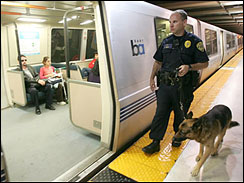The demise of Osama Bin Laden has transit officials across the country preparing their agencies for possible retaliatory attacks. In Washington, Mayor Vincent Gray informed constituents via Twitter that "users will see an increase in # of officers throughout [Metro] system (trains & buses)." In New York, a spokesperson announced MTA had "increased security at key locations across the MTA's transportation system and remain on high alert." NJ Transit also beefed up security.
House Transportation Committee Chair John Mica (R-FL) and Homeland Security Secretary Janet Napolitano sounded the alarm about possible retaliation on mass transit systems within hours of the announcement of bin Laden's death, though there were no credible threats and Napolitano did not issue an alert.
However, the push for increased transit security continues. This morning, transit professionals from across the country, testifying before the House Homeland Security Committee, used the opportunity to argue for increased federal transportation funding. They painted a grim picture of surface transportation security if funding is cut in the next reauthorization and seized the opportunity to ask members of congress to maintain funding for all facets of surface transportation security.
The Hearing opened with remarks from Chairman Peter King (R-NY), who warned that achieving “false economies” by reducing funds to transportation security could certainly bring a greater blow to the national economy if it “encouraged our enemies to launch a terrorist attack” of any size on our mass transit systems.
Without federal funding to support increased security, transit authorities like Chicago’s would have to cut service, said CTA President Richard Rodriguez. After a year of heavy cuts from state and local governments, CTA is concerned that if funding cuts to FEMA made in the FY2011 Budget were not resolved elsewhere, planned security measures would be postponed for several years. If additional cuts are made, people across 40 cities in Illinois could face reduced service.
While Rodriguez’s comments were bleak, no one was as direct as Daniel Hartwig, deputy chief of operations for the San Francisco Bay Area Rapid Transit Police Department (BARTPD), who said, “we could cease to exist” if federal funding were substantially cut for their program. BART carries 350,000 riders on a typical day. On an atypical day, like when the San Francisco Giants made it to the World Series, ridership numbers can jump 67 percent, making the city an immediate target for potential terrorist threat and requiring a significant security expense for his department.
Speaking on behalf of New York City's Police Department, Deputy Commissioner for Counterterrorism Richard Daddario also made it clear that New York City relies on federal money. Another terrorist attack would "choke" the city, he said. In a city where so many rely on transit to get to work, to shopping, to everywhere, anything that scared people off the bus or metro would bring a halt to the culture of urban life: “Moving about is not just about finances and economics, it’s about how we live.”
What does this mean for people who rely on mass transit? It is clear that TSA and FEMA support more security teams, cameras and other safety measures in all major transit centers, but these are not the only things your local transit agency might have to cut if federal funding falls short. Security is a priority and if your local station cannot be secured, your local bus route might just stop running.






